UWW announces 2024 Hall of Fame inductees
Wednesday, July 31, 2024 - 10:07 By United World Wrestling Press

PARIS (July 31) -- In his earlier life, Steeve GUENOT (FRA) was a railwayman. He juggled his day job with his passion, wrestling, which led him to the Olympics.
There, on the biggest stage of all in Beijing 16 years ago, the Frenchman scripted history—winning a gold medal to end his country's 80-plus-year drought of producing an Olympic champion wrestler. That moment changed his life, and Guenot went on to inspire a generation of wrestlers.
For his path-breaking achievements on the mat and his restoration of belief in an entire nation, the French hero was inducted into the United World Wrestling Hall of Fame days before the Paris Olympics were declared open.
The Beijing Games gold medallist, who also won a bronze at London 2012 and a bronze medal in the 2007 World Championship, was among the three wrestlers included in this year's list. The other two were freestyle legend Mavlet BATIROV (RUS) and Canadian trailblazer Tonya VERBEEK (CAN).
Additionally, referee Vassilis PAGONIS (GRE) and legendary Armenian coach Levon JULFALAKYAN (ARM), too, were accorded the prestigious honor this year.
The Hall of Famers are permanently recognized on UWW's website, at the organization's headquarters in Vevey, Switzerland, and in the international wing of the USA Hall of Fame in Stillwater, Oklahoma.

A 66kg category Greco-Roman champion, Guenot was born to a family of wrestlers in 1985. Both his parents were involved in the sport, and his siblings were, too. Like him, Guenot’s brother Christophe is an Olympic medallist. But no one scaled the heights that Guenot did.
France hadn't won an Olympic gold medal in wrestling since the 1936 Games when Emile Poilve finished on top of the podium.
Guenot broke that hoodoo and went on to win a lot more. After a highly successful playing career, he moved to coaching and was involved in grooming young wrestlers at his club in Dijon, something he has done to date.
Joining him on the list of honors is a Russian legend whose name is synonymous with excellence. One of the true greats of the sport, Batirov won admirers all over the world with his gritty wrestling style. He was one of the most dominant wrestlers in the noughts, particularly in the 55kg men's freestyle category, before he moved to 60 kg due to weight class adjustment.
Born in 1983, Batirov’s first big moment came in 2004, when he won the gold medal in the 55 kg category at the Athens Olympics. He went on to win his second Olympic gold medal four years later while competing in the 60 kg category and during that four-year cycle, he won the world title as well as a world championship bronze at 60kg.
These results, combined with multiple European championship medals, sealed his status as one of the finest wrestlers to ever step on the mat. After he retired from the sport, Batirov gave back to it by mentoring and coaching young wrestlers and sharing his deep insights into the game with them.

Like Guenot and Batirov, Verbeek too has had an outsized influence on the sport, especially in her country.
After the Ontario native picked the sport as a schoolgirl at age 11, Verbeek reportedly remained undefeated throughout her career as a school-level wrestler. She nearly mirrored that level of success as a senior in international wrestling.
Despite the total dominance of Japanese wrestlers, Verbeek carved out a niche for herself with her fearless style of play. She was the first Canadian woman to win a wrestling medal at the Athens Games, a silver, went on to add a bronze to her collection four years later in Beijing and completed the hattrick of medals by clinching the silver medal at the London Olympics. Apart from these, she has multiple worlds, Pan-Am and Commonwealth Games medals.
After retiring, Veerbek would break more barriers, becoming the head coach of both the men's and women's Canada teams. She currently coaches the women's program at the University of Iowa.

While all these wrestlers across the three events are legends in their own right, few actually come close to doing what Julfalakyan did.
As a wrestler, he has won it all -- Olympic gold, World Championship gold, and European Championship gold. His Olympic title in 1988 was a great exhibition of his art, as he won all his bouts in a one-sided manner to romp through the field and win the gold.
After he hung his boots, Julfalakyan turned to coaching. The academy where he coached turned into a conveyor belt of talented wrestlers. He has produced an Olympic champion, and multiple Olympic silver bronze medallists, as well as seven world and 14 European champions.
His elder son, Arsen, went on to win a silver medal at the London Olympics. In 2011, Julfalakyan was also feted at home after the country's government released postage stamps in his honor.
 Vassolos PAGONIS, referee. (Photo: United World Wrestling)
Vassolos PAGONIS, referee. (Photo: United World Wrestling)
Last but not least, referee Pagonis has also been included in the Hall of Fame. The Greek referee has officiated in five Olympics, 20 World Championships, and 25 European Championships. At the 1996 Olympics, Pagonis was feted with a Golden Whistle award.

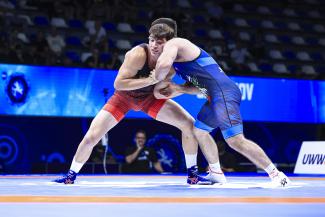
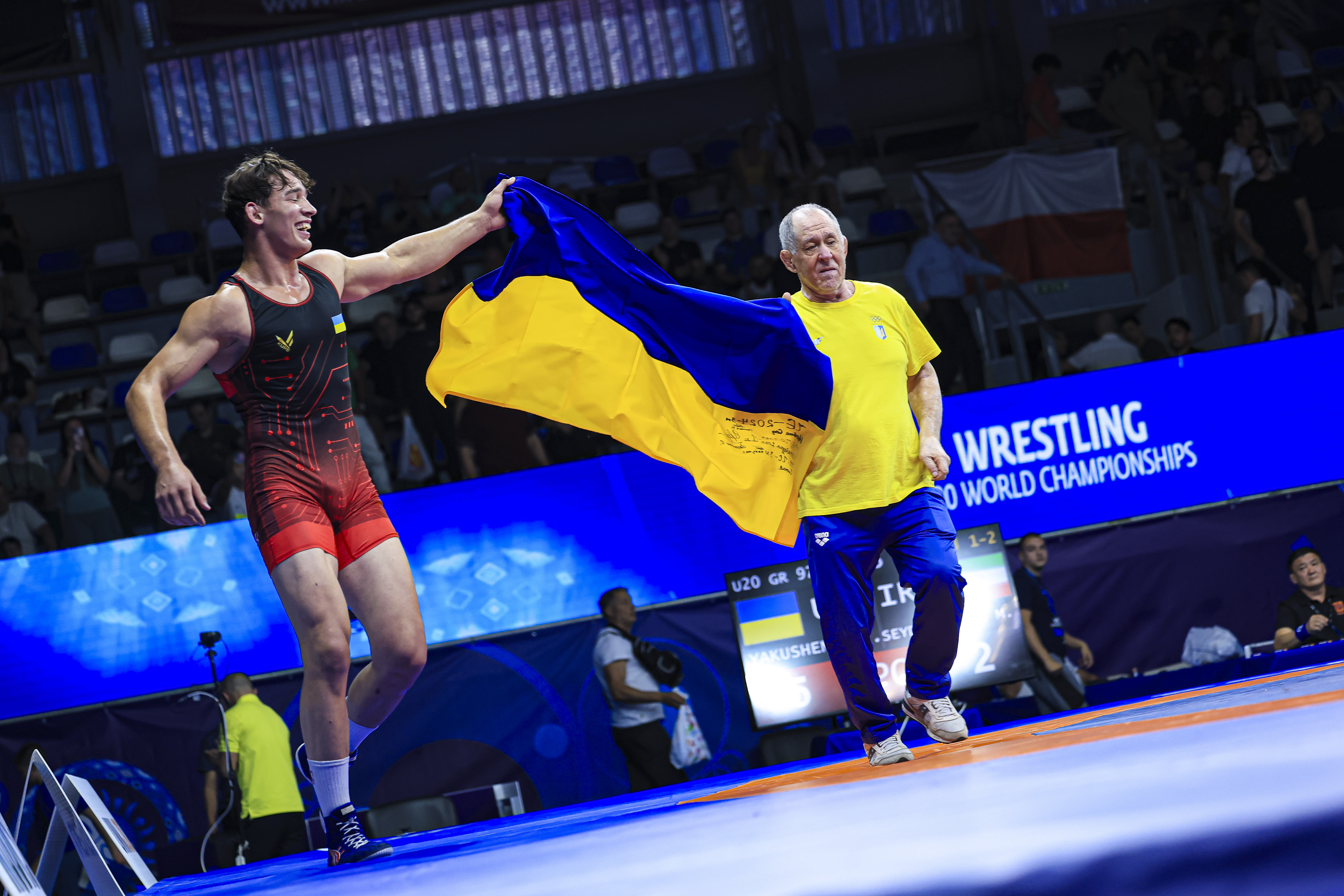 Yehor YAKUSHENKO (UKR) celebrates after becoming the world U20 champion for the second time. (Photo: United World Wrestling / Kadir Caliskan)
Yehor YAKUSHENKO (UKR) celebrates after becoming the world U20 champion for the second time. (Photo: United World Wrestling / Kadir Caliskan)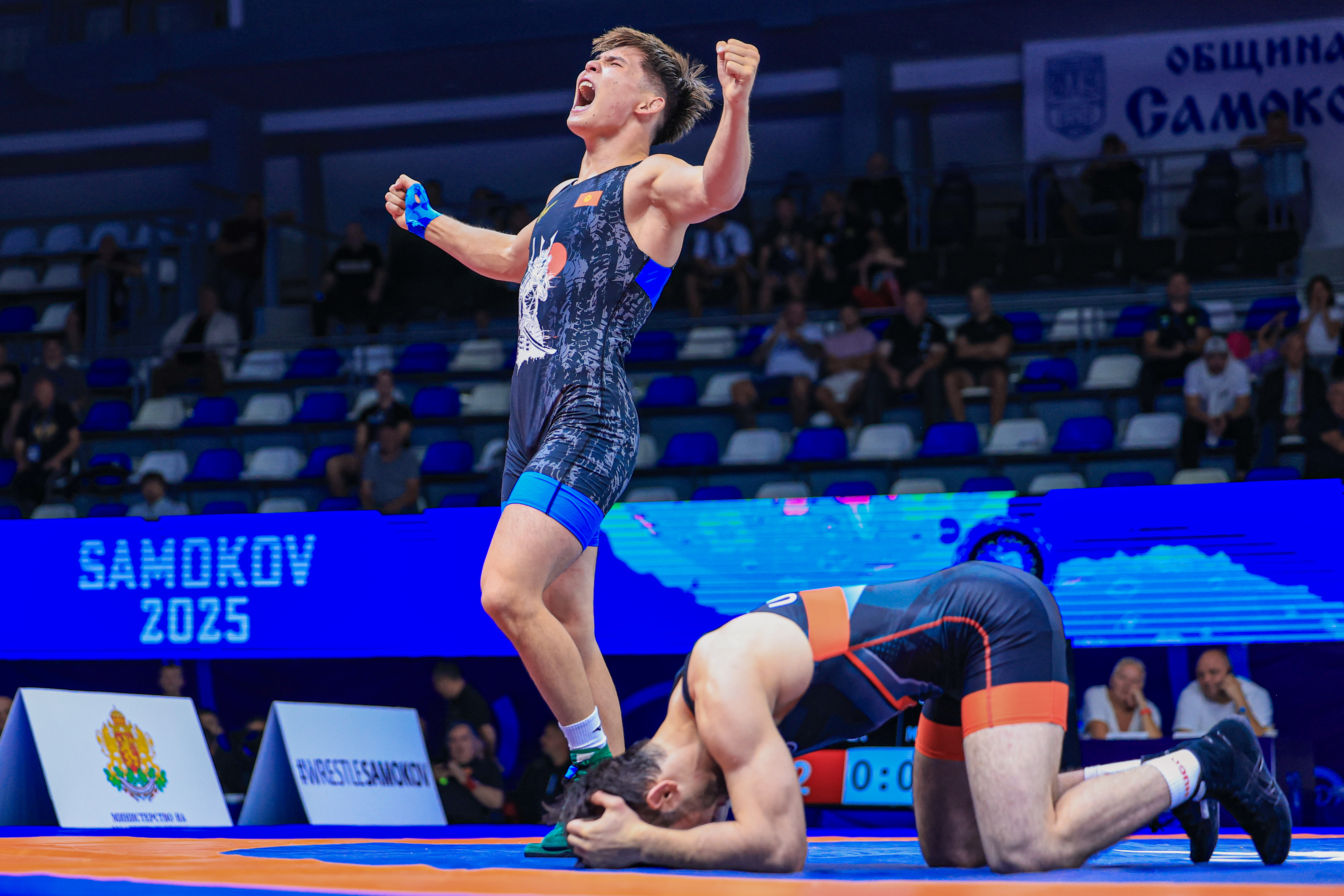 Zhantoro MIRZALIEV (KGZ) celebrates after beating Erzu ZAKRIEV (UWW) in the 67kg final. (Photo: United World Wrestling / Amirreza Aliasgari)
Zhantoro MIRZALIEV (KGZ) celebrates after beating Erzu ZAKRIEV (UWW) in the 67kg final. (Photo: United World Wrestling / Amirreza Aliasgari)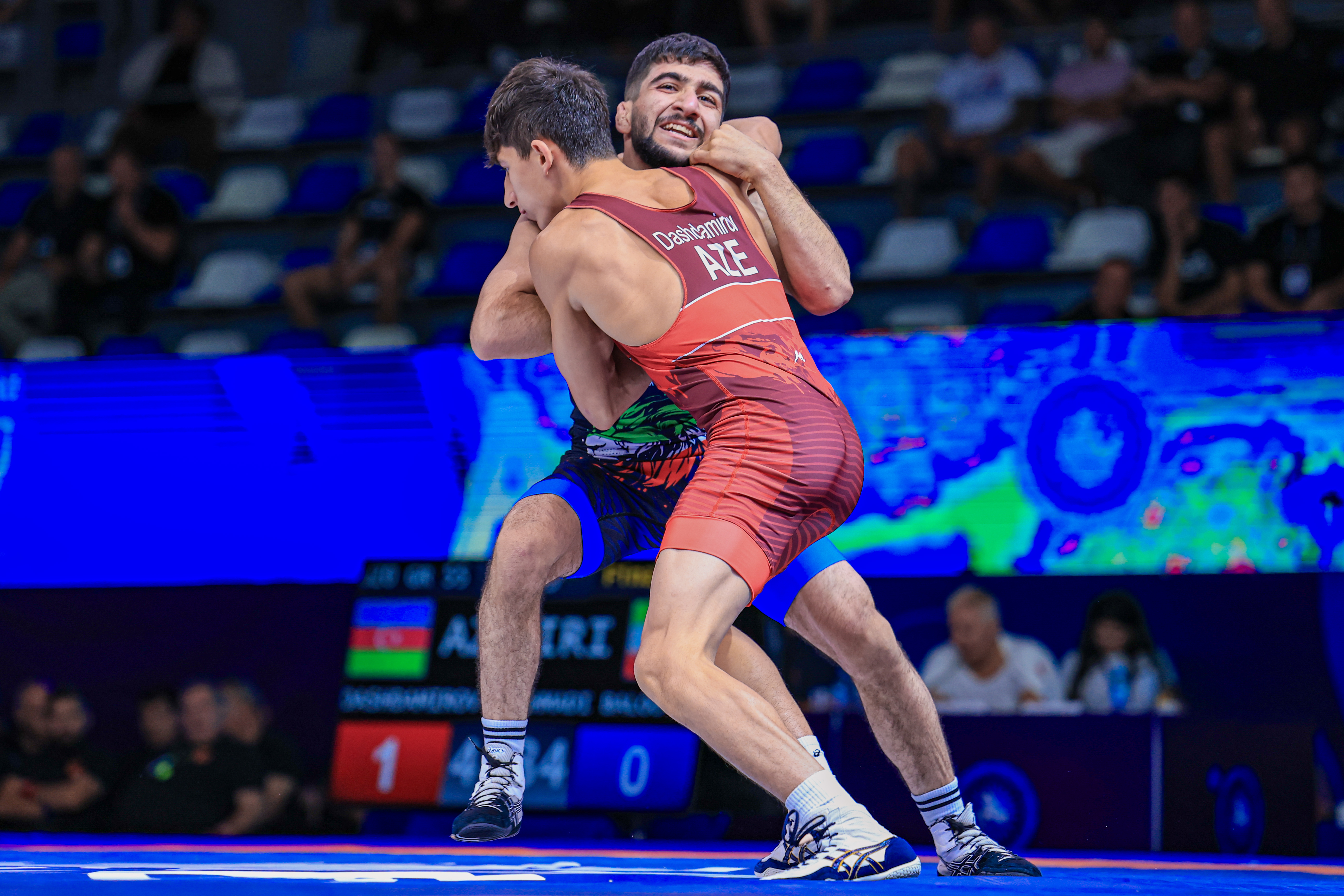 Payam AHMADI (IRI) scores a takedown against Turan DASHDAMIROV (AZE) in the 55kg final. (Photo: United World Wrestling / Amirreza Aliasgari)
Payam AHMADI (IRI) scores a takedown against Turan DASHDAMIROV (AZE) in the 55kg final. (Photo: United World Wrestling / Amirreza Aliasgari)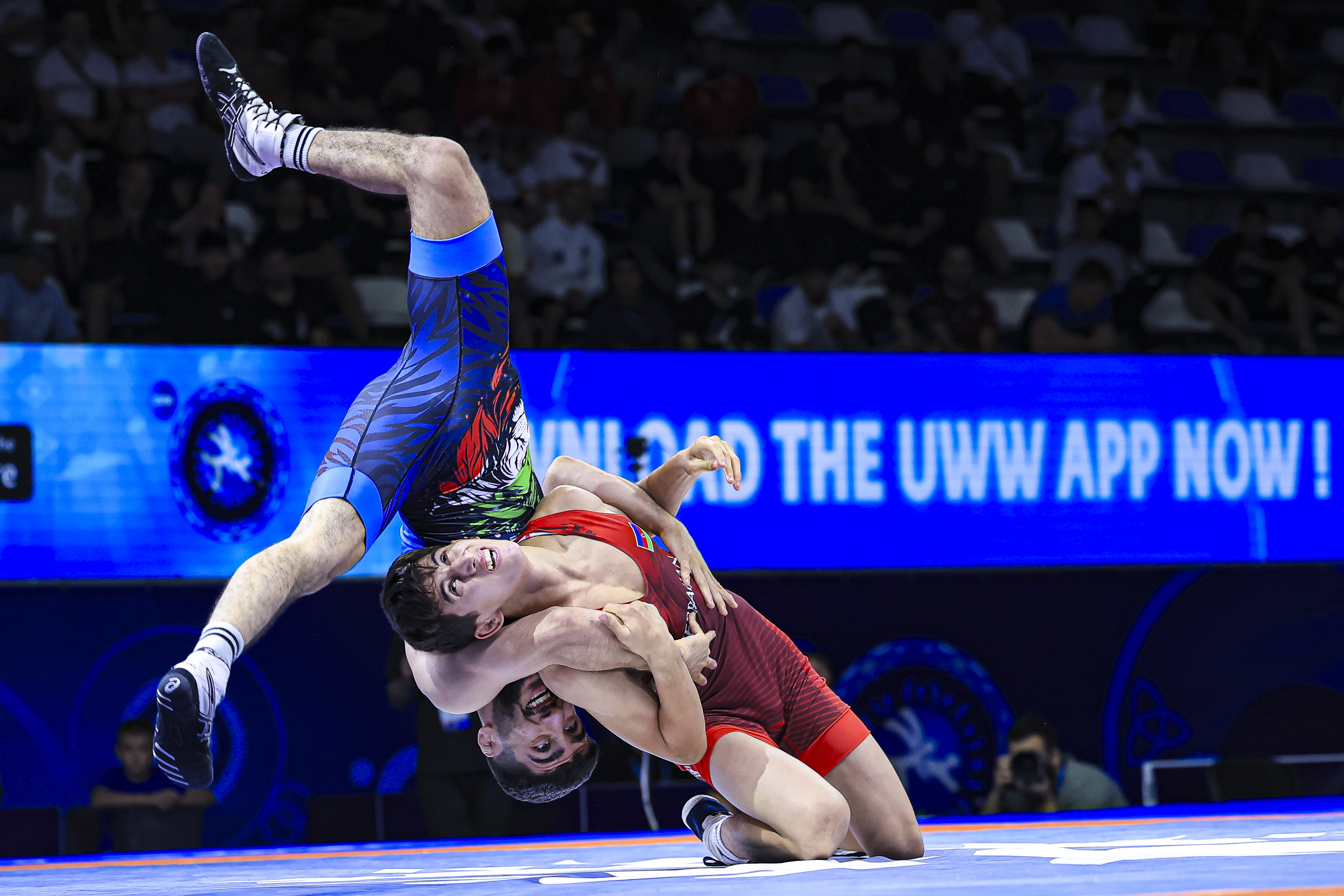 Turan DASHDAMIROV (AZE) hits a fireman carry for no points against Payam AHMADI (IRI) during the 55kg final. (Photo: United World Wrestling / Kadir Caliskan)
Turan DASHDAMIROV (AZE) hits a fireman carry for no points against Payam AHMADI (IRI) during the 55kg final. (Photo: United World Wrestling / Kadir Caliskan)
Share your thoughts.
Comments